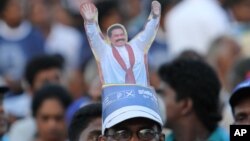Sri Lankans voted Thursday to choose a new president in a high stakes race that pits President Mahinda Rajapaksa against his former aide, Mithripala Sirisena. The contest is expected to be the tightest the nation has witnessed in decades.
As Mahinda Rajapaksa cast his vote in Hambantota district, he exuded confidence.
"We are going to win this handsomely," he said, adding that it will be seen as a great victory by treating the defeated well.
But as voters stood in long lines to cast ballots, uncertainty ran high about the president being able to win a third term.
Rajapaksa was seen as politically invincible when he called elections two years ahead of schedule. However he received a huge blow after his former Health Minister, Mithripala Sirisena, quit his government to become the main opposition candidate. Sirisena has won the backing of a raft of parties including those representing the ethnic minorities - the Tamils and Muslims.
President Rajapaksa has campaigned on the victory he won against the Tamil Tigers in 2009 and on the plank of development, pointing to an economy that has grown rapidly since the end of the civil war.
Sirisena has promised to root out corruption and end the stranglehold on power of Rajapaksa and his family, whom the President has appointed to key positions in the government.
His supporters point to the enthusiasm among voters as evidence of a yearning for change in the country.
Saying “victory is in sight,” Sirisena promised “a new political culture from tomorrow.”
Rajiva Wijesinha was among the first of over two dozen lawmakers who have crossed over from the president’s side to join Sirisena. Wijesinha says they want to overhaul governance and abolish the executive presidency that concentrated power in the president’s hands.
“There is a lot of corruption, there is a lot of arbitrary decision making. We want to [have] a lot more accountability and changes in the standing order to give the opposition much more power within parliament. Because we feel institutions have collapsed - parliament, the judiciary, the media, the public service,” said Wijesinha.
The President’s close supporters, like Media and Information Minister Keheliya Rambukwella, say there is no truth in such charges. “One has to prove that there is corruption. It has become a talk shop. There is an organized group which feels the president cannot be defeated and the only way is to attack his credibility,” stated Rambukwella.
Armed guards stood at polling stations due to concerns of violence, but the voting was largely peaceful. There were reports of a hand grenade explosion near a voting station in Jaffna, but no one was wounded.
Keerthi Tennakoon, who heads the independent local monitoring group The Campaign for Free and Fair Elections, says barring sporadic incidents, voting was largely “satisfactory”.
“So far everything [is] under control. When we were getting complaints, the police and election officers specially, we have seen [them] putting a tremendous effort, to calm down the situation, specially when they received complaints of election intimidation,” Tennakoon explained.
The run up to the election had been marred by allegations of misuse of state funds and reports of voter intimidation.
Results from the polling are expected by Friday.




